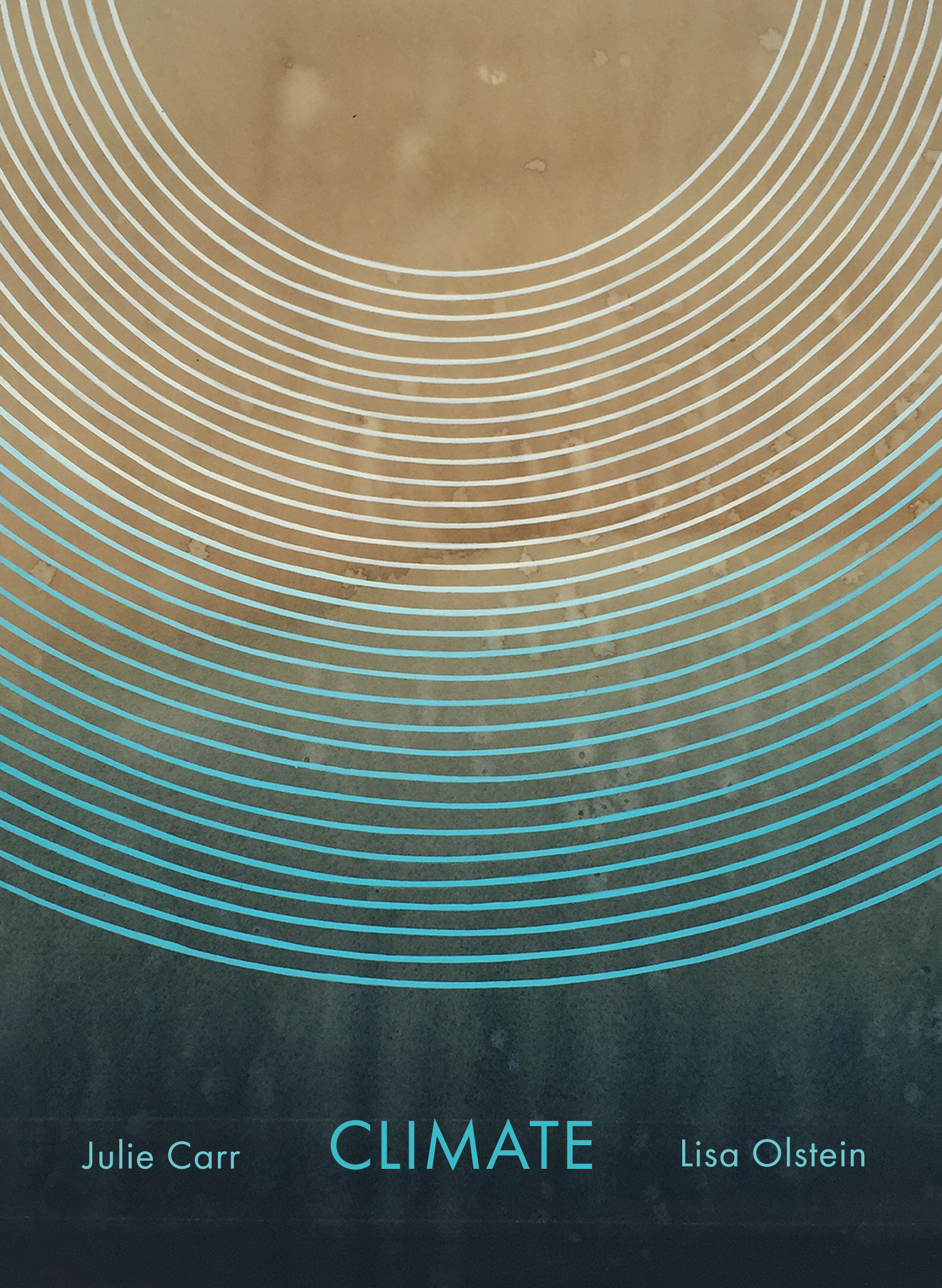An epistolary exchange with Julie Carr. Cover art by Kelly Ording.
Available wherever books are sold—Essay Press, Barnes & Noble, Amazon.
climate
Epistolary is the wrong word for this essential book’s process and form. Rather, its correspondents—two women writers, researchers, professors, partners, mothers—explore correspondences and divergences in letters whose rhythm, in language and movement, struck me as dance-like, a pas de deux on a darkened, often timorous stage. The stage, specifically, is 2018, a year, like those that bookend it, of mass shootings, mudslides, #Metoo, internment camps and Kavanaugh hearings, apocalyptic floods and fires, climate change as allegory and reality. They write for reasons both articulable and not. “At the moment, I write to talk to you and so you’ll write back and I can listen. That is, to be an I and a you in a time named the present,” one says, and it strikes me how baseline, how vital, such literary correspondences have been through time, and how rare and necessary they are now. The letters contain profound moments of intimacy in equilibrium with a keenly delineated selfhood, a “deeply-engaged attention between sympathetic minds.” No one overpowers, caves, or folds. The old questions are renewed, and amplified by the lateness of the hour; the answers are hard-won and ephemeral. In the end, this book turns like a jewel, exposing the facets of a friendship—as shared grief, as resistance, as the process of “wandering, through our microclimates, those we share and those we don’t but want to or could, to make for you a space of possibility and hope, even happiness, in the midst of your grief.” Yes. Me too. And the closing before the signature of each letter is a word that Carr and Olstein renegotiate and revive each time it is written: Love.
―Diane Seuss
A woman, “flanked by women who are reading,” is writing a letter as she wafts through the stratosphere, eerily suspended just above the turbulence of our times. Reading it, and what follows, you also find yourself flanked by women reading, and writing, seemingly to each other, maybe to themselves. In Julie Carr and Lisa Olstein’s tender, meticulous correspondence, the boundaries between letter, poem, essay, between reader, writer, friend, blur, as one question comes into focus: how are we to live our lives? Climate, like climate, takes you unawares, until you realize: you are the one that's being asked to answer.
―Barbara Browning
The letters of CLIMATE, between correspondents Julie Carr and Lisa Olstein, recreate the dailyness of life in relationship, in parenthood, in joy, in death, in heartbreak, all occurring under the shadow of climate catastrophe with its resultant human tragedy. The projections into a dire future are countered, but never sugar-coated, by the power of the intimate, the specific observed moment, the sharing of lives. Hope is often refuted by despair and vice versa. I fell in love with this book, in the way an intimate correspondence becomes something so much bigger than the individual voices who reach across space to speak and listen to one another. Olstein and Carr are each other’s ideal listeners, and we are fortunate to eavesdrop on their lives and hearts as they navigate the devastation so clearly laid out before all of us. “My hope,” Julie says, “if you want to call it that, is cast so far into the future that it has nothing to do with our generation or our kids or their kids or grandkids. But it helps me to survive the time we are living to think that eventually, humans reimagine, rebuild. Maybe this is not different from believing in God. An afterlife.”
―Samuel Ace
Correspondance between poets Julie Carr and Lisa Olstein reveals a friendship rooted in storytelling, curiosity, and examinations. These honest letters affirm what we always imagine exists between friends who happen to be brilliant writers: an exchange not just of words and ideas, but empathy and genuine intimacy.
―Nina Loehlin, Brink Literary
We could try writing letters, one of us said to the other after our cross-country trip was over and we weren’t done talking. Talking about hurricanes, fires, floods, droughts, freezes. About shootings, bombings, border crises, #MeToo. Jewishness, whiteness, feminism. Fear, ambition, desire. Work, marriage, friendship. Grief, anger, illness, and suicide. At once anecdotal, philosophical, political, and deeply personal, the letters quickly come to sustain a different kind of present moment: a way of finding self through other, a portal into urgent and shared contemplation, a means of saying what otherwise feels unsayable. Propelled by events both public and private, these epistolary essays comprise a catalog of living with and thinking through the climatic disturbances that determine our lives. Finding kinship in other epistolary exchanges, from Paul Celan and Nelly Sachs to Etel Adnan’s Of Cities and Women to Martin Land and Jonathan Boyarin’s Time and Human Language Now, they inhabit the experiment of talking and listening in the unspooling, untenable now, while exploring what it means to be an “I” and a “you” in the alternate present letters invent.
